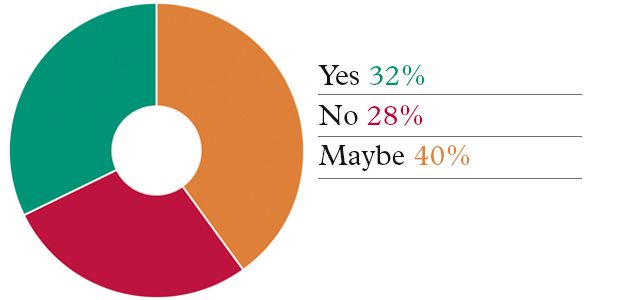
Our community looks at the impact of the gender pay gap reporting deadline later this spring
A third of organisations are looking to address their gender pay balance after preparing for reporting requirements that will take place in late March and early April, according to the latest survey of governance professionals by Governance and Compliance and Core.
The poll split the audience fairly evenly, with 32% claiming they were considering their options after preparing a report, 28% not doing so, and the rest unsure. Additionally, 86% said they were on course for the reporting deadline, with only 2% not ready, and the rest unsure.
Many reported that their figures reflected a disparity in the roles held by either gender. 'The focus is on getting more women in senior positions – there is no gender pay gap on a role basis,' said one person. 'It is all about having more women at the top'.
As such, a lot of firms are looking at their recruitment and promotion strategies. One respondent said their organisation is planning on 'encouraging and mentoring women for promotion and into higher paid professions.' Another said they would be 'including a mandatory female candidate on the shortlist for every vacancy.'
One respondent said there would be a 'focus on flexible working conditions' and diversity networks. Another said their organisation would be 'reinforcing internal messages about equality of opportunity', and another planned to respond through 'comms and additional recruiting.'
Most organisations were not too saddled by the reporting requirements – 62% said few resources had been spent in preparation. In explanation, one said: 'We have a fairly small UK workforce.' Another replied: 'We should already have this information.'
But 19% said it had been costly. 'It has required additional management time and resources to compile and review the data,' said one respondent. Another said: 'The identification of data and the narrative to contextualise that data has been resource-intensive.'
Opinions diverged on the wider impacts of the reporting requirement. 'Understanding what the report means is not straightforward,' one person said.
Another added: 'I have some concerns over the interpretation of the data as some people may try to use it to prove a point, but longer term, more openness and transparency can only be a good thing.'
Many believe the process will shame disobliging firms into reducing the pay gap. 'Naming and shaming will drive active management of the issue,' one respondent said. 'What gets measured gets managed!'
'It will create a few headlines and ensure fairness between individuals,' one person said. 'But will do little to improve equal pay given the long hours and inflexible culture that dominates senior employment levels, making it unappealing or difficult for women to make it to these levels.'
Some respondents were still more sceptical, with one saying: 'The reporting may address current pay gaps, but unless the fundamentals change – such as access to jobs and flexible working patterns for caregivers – there will continue to be disparity between gender pay.'
One respondent said the exercise would generate 'a lot of noise due to lack of understanding of gender pay versus equal pay, and everyone saying they are doing the same things they are actually already doing.'
A likeminded person added: 'In the long run it will just become a tick boxing exercise.' Similarly, another said: 'It will make an non-issue into an issue and could be counter-productive as it ignores competency, experience and a person's ability to negotiate their pay.'
One respondent predicted actual damage from reporting. 'Watch out for the law of unintended consequences,' they said. 'Because averages for gender pay gap analysis are based on hourly rate or headcount, it encourages companies to replace lower paid female part time staff with the equivalent in full time staff.'
More optimistically, another person believed reporting might be useful for recruiting, saying: 'Hopefully, people will chose us over competitors to work for and do business with.'
Conducted in association with The Core Partnership
The content of this article is intended to provide a general guide to the subject matter. Specialist advice should be sought about your specific circumstances.


